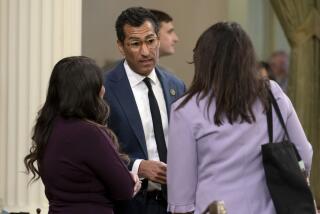Reagan Seeks Constitution Amendment on Tax Hikes : ‘Super’ Majority Vote Urged
- Share via
WASHINGTON — President Reagan, seeking to make it harder to increase taxes, will propose Friday amending the U.S. Constitution so that tax hikes can be imposed only with the approval of an unspecified “super” majority of Congress, a senior White House official said today.
The official said Reagan will also propose that legislation authorizing new spending programs be accompanied by a statement explaining where the revenue will come from, and how much the program will cost four or five or even more years in the future.
The President will make the proposals in a speech outlining an “economic bill of rights” at the Jefferson Memorial, at the start of the Independence Day holiday in Washington.
The address is intended to draw attention to the White House’s economic program--and its fight with Congress over the federal budget--at a time when the Senate and House are balking at imposing the cuts Reagan is seeking. Congress has instead proposed a $1-trillion budget that would spend more on domestic programs, and less on defense, than Reagan has sought.
Rarely Approved
Under current law, tax increases can be imposed if they are approved by a “simple” majority--one vote more than half of those in the Senate and House--and if they are then signed into law by the President. In reality, however, such increases are rarely approved unless larger numbers of the members of Congress support them, because few wish to put themselves at political risk by voting for higher taxes that are not widely supported.
The White House official said Reagan will not specify the size of the majority he would advocate for approval of tax increases.
Reagan’s speech will kick off a series of talks the President will give in Washington, Connecticut and the Middle West in coming weeks, as Congress works on the budget.
4 Elements of Plan
As outlined by the White House official, who spoke on the condition of anonymity, the four elements of the so-called “economic bill of rights” focus on: a constitutional amendment requiring the federal budget to be balanced; greater emphasis on the private sector in the national economy; freer markets and greater world competitiveness in trade, and a reduction of government regulation of the economy.
Although these are frequent themes in Reagan speeches, going back more than a decade, the White House will couple them with the proposal to toughen the process of obtaining tax increases, and the “truth in spending” proposal, in an attempt to draw new attention to them.
The proposal to spell out specific costs of new programs would apply to those begun both by the Administration and by Congress, and would amount to a “financial impact statement” intended to make clear the ultimate costs of any new efforts undertaken by the government.
“If you have a catastrophic health insurance bill, people need to understand the impact down the road, four or five years,” the official said.
Less Confrontational
In recent speeches, Reagan has sought to rally support for his budget proposal, in the face of the opposition of Democrats who hold majorities in both chambers of Congress. Friday’s speech, however, is said to be written with a less confrontational tone.
“It’s not a speech designed to take on Congress,” the White House official said.
At the same time, the President’s aides hope that Reagan will be able to take advantage of a slight improvement in his political standing, as measured by public opinion surveys carried out for the White House.
More to Read
Sign up for Essential California
The most important California stories and recommendations in your inbox every morning.
You may occasionally receive promotional content from the Los Angeles Times.










